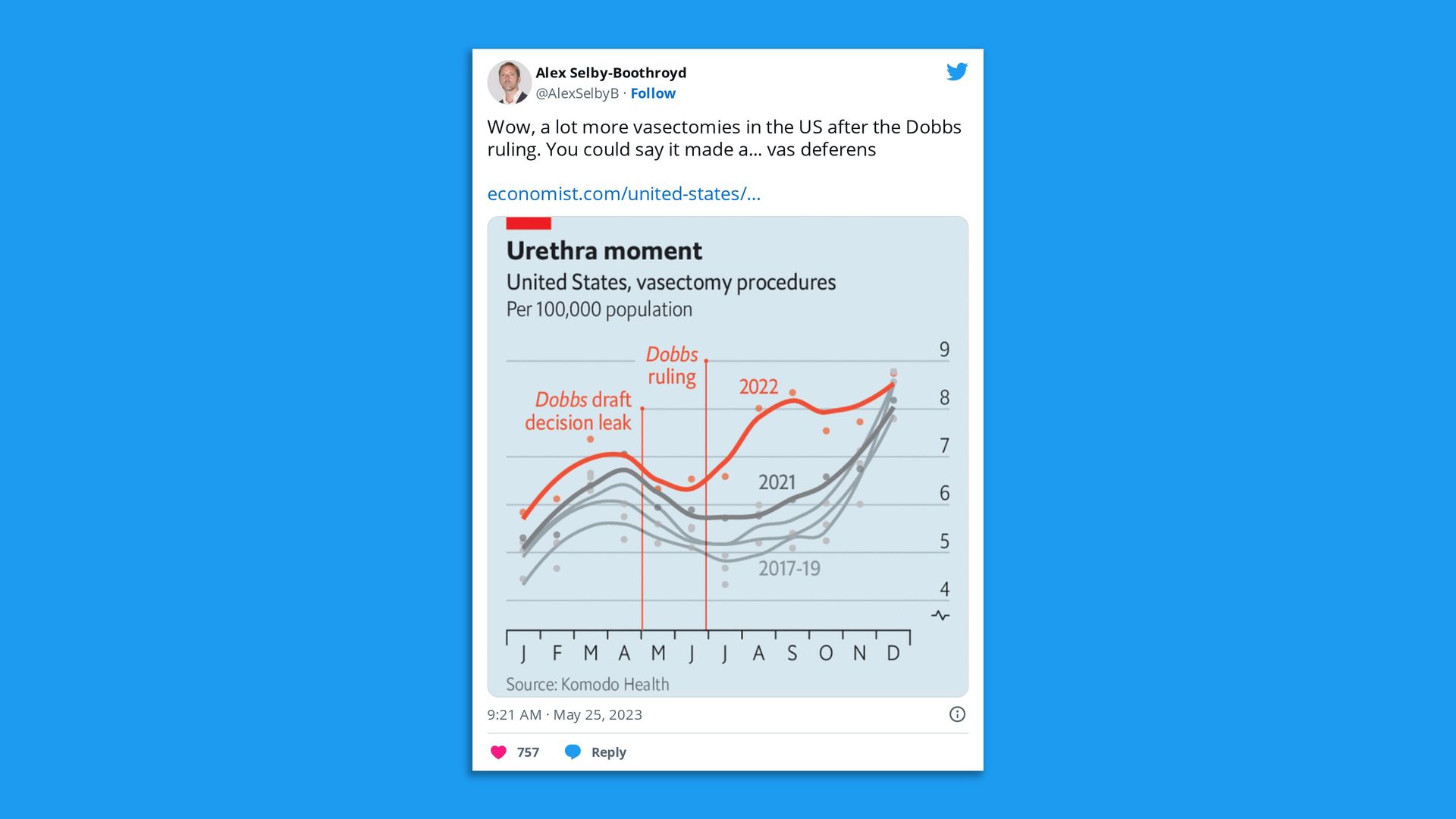| | | | | | | | | | | Axios Vitals | | By Tina Reed · May 26, 2023 | | Happy Friday, Vitals readers! Today's newsletter is 955 words or a 3½-minute read. 🇺🇸 Programming note: Vitals will not publish on Monday in observance of Memorial Day. We wish you all a safe holiday weekend. | | | | | | 1 big thing: FDA's medical device blindspot |  | | | Illustration: Shoshana Gordon/Axios | | | | An effort to get the FDA to pull a widely used prescription drug monitoring software package off the market is stoking a broader debate over how much technology is influencing opioid prescribing, Axios' Oriana González and Sabrina Moreno write. Driving the news: The Center for U.S. Policy says Bamboo Health's NarxCare should be classified a medical device and subject to regulation, because of the way it helps doctors and other providers decide if a patient should get painkillers. - In its citizen petition, the center writes that NarxCare — which is used in over half of the states — has "altered the practice of medicine" and denied patients access to potentially necessary treatments.
- The center is urging that NarxCare be declared a misbranded medical device and be pulled from the market.
- Patients on long-term opioid therapy or in acute pain keep being turned away by providers, said Beverly Schechtman, vice president of the Doctor Patient Forum, a volunteer nonprofit focused on pain patients. "It is getting worse and worse and worse," Schechtman told Axios.
- But Bamboo Health says NarxCare is "expressly exempt from FDA regulation" because it does not make clinical recommendations and just helps providers make treatment and dispensing decisions.
How the FDA responds could set an important precedent at a time when the agency is feeling increasing pressure to manage the overdose crisis and keep up with the rise of technology in health care. - "If they put the time and effort into making a thorough response to it, it will lay the groundwork for future regulation," said Nabarun Dasgupta, an epidemiologist at the University of North Carolina's Injury Prevention Research Center who has evaluated prescription drug monitoring programs and says Bamboo Health is "splitting hairs."
What we're watching: The FDA is expected to respond to the petition by late October. The intrigue: An agency decision that NarxCare be considered a medical device could put the FDA in conflict with some state laws, Zegarelli told Axios. - The FDA would have to decide whether it has a specific oversight over the software, or potentially say that NarxCare falls under state jurisdiction under the argument that it enables state-run PDMPs.
|     | | | | | | 2. Researchers define long COVID |  | | | Illustration: Sarah Grillo/Axios | | | | Researchers identified a dozen symptoms that most commonly characterize long COVID, based on an analysis of nearly 10,000 participants in a National Institutes of Health effort to study the long-term health effects of the virus, Axios' Arielle Dreher writes. Why it matters: Though more than 658 million people worldwide have been infected, researchers said most studies have focused on defining long COVID based on the frequency of individual symptoms — and have generated widely divergent estimates of their prevalence. - As many as 23 million Americans continue to experience COVID symptoms six months or more after initial infection, and understanding the most common symptoms can better help diagnose and treat cases.
What they found: Researchers found 37 symptoms as present more often in infected participants at six months or longer after infection, then winnowed that list down to the dozen most distinct symptoms. - Those include malaise after exertion, fatigue, brain fog, dizziness, gastrointestinal symptoms, heart palpitations, changes in sexual desire, loss of smell or taste, thirst, chronic cough, chest pain and abnormal movements.
- Patients were more likely to report having long COVID and have more severe symptoms if they were infected before the Omicron variant began circulating, the researchers wrote.
|     | | | | | | 3. Bacteria clues to early-onset colorectal cancer |  | | | Illustration: Eniola Odetunde/Axios | | | | The type of bacteria in colorectal cancer tumors varies significantly between younger and older patients, offering clues about why cases are rising in people under 45, according to a study due to be presented at next week's American Society of Clinical Oncology annual meeting. Why it matters: While the incidence of colorectal cancer in the U.S. has declined overall, it's risen dramatically among patients under 45, since the mid-1990s. - In many cases, the cancer is more aggressive in those younger patients than it is in older patients, puzzling doctors.
This study points to possible bacterial factors at play, Benjamin Weinberg, lead author and a gastrointestinal medical oncologist at Georgetown University Medical Center, told Axios. Details: Other studies, including one published this week in Nature Medicine, have examined the presence of bacteria in metastatic colon cancer. - But, Weinberg said, this research team specifically wanted to look at the differences between age groups.
- One particular bacteria appeared more often in the tumors of early-onset colorectal cancer patients while a series of other bacteria were more common in the tumors of older patients, and not present in younger patients.
The bottom line: "The goal ultimately is to try to explain why younger people are getting these tumors in the first place and try to figure out biologically, 'Is there some difference?'" Weinberg said. Go deeper. |     | | | | | | A message from Axios | | The Axios Today podcast | | |  | | | | Catch up on the important news and interesting stories you won't hear anywhere else with host Niala Boodhoo. Each weekday morning, get the latest in everything from politics to space to race and justice. Listen now for free. | | | | | | 4. Tweet du jour |  | | | Screenshot: @AlexSelbyB (Twitter) | | | | In a new sign of the times, the Economist reported the number of vasectomies in the U.S. rose by 29% in the first three months following the Supreme Court's Dobbs decision that struck the constitutional right to abortion. - Alex Selby-Boothroyd, data journalist at the Economist, couldn't resist going there with the pun.
|     | | | | | | 5. Catch up quick | | 🚫 Illumina shareholders vote chairman out after Icahn fight. (Axios) ✅ FDA grants full approval to COVID antiviral Paxlovid for high-risk adults. (Axios) 👀 The DEA's failure to punish a distributor blamed in the opioid crisis raises revolving door questions. (Associated Press) 💻 Using AI, scientists find a drug that could combat drug-resistant infections. (MIT News) |     | | | | | | 6. Dog of the week |  | | | Gronk. Photo: Kim Wix | | | | Meet Gronk, a chow, akita, American staffie, pug mix mutt who helps ensure some work/life balance for his human Kim Wix, head of corporate communications at Daiichi Sankyo. - "When not closing laptops, Gronk relishes sprinting after fragrant odors in the forest, and basking in the sunshine." That seems like a good cue for the rest of us to follow suit and get this long weekend started, Gronk!
|     | | | | | | A message from Axios | | The Axios Today podcast | | |  | | | | Catch up on the important news and interesting stories you won't hear anywhere else with host Niala Boodhoo. Each weekday morning, get the latest in everything from politics to space to race and justice. Listen now for free. | | | | Thanks for reading Axios Vitals, and to senior editor Adriel Bettelheim and senior copy editor Bryan McBournie. Please ask your friends and colleagues to sign up. |  | | Dive deeper into the future of health care | | | | | | Axios thanks our partners for supporting our newsletters.
Sponsorship has no influence on editorial content. Axios, 3100 Clarendon Blvd, Arlington VA 22201 | | | You received this email because you signed up for newsletters from Axios.
To stop receiving this newsletter, unsubscribe or manage your email preferences. | | | Was this email forwarded to you?
Sign up now to get Axios in your inbox. | | | | Follow Axios on social media:    | | | | | |
No comments